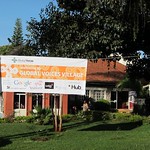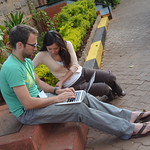The summit was an amazing five-day gathering of bloggers, translators, and academics who care about blogs and citizen media around the world. For the first few days, as Global Voices working groups developed ideas for the future of their community, an academic conference organized by Zeynep Tufekci discussed the Internet and social change. After a day of rest and safari, we reconvened for a remarkable two-day conference, a public celebration and reflection on the promise and challenges of citizen media around the world.
Matt Stempeck and I were privileged to blog many of the public conversations:
- The Global Rise of Citizen Media (amazing stories!)
- Tensions Online Between Nations and their Diasporas
- Rising Voices: Wiring Offgrid Villages and Preserving Language Online (amazing stories!)
- How do Small African Nations Grab the World's Attention?
- Keeping Endangered Languages Alive Online
- The State of Kenyan Citizen Media
- Visualizing Data (I spoke on this panel alongside the remarkable MapKibera, TacticalTech, SocialFlow, and Tarek Amr)
- The Internet, SMS, and Participatory Health
- The Social Roles and Responsibilities of Internet Giants such as Google and Facebook
- Are They Watching Me? Internet Surveillance






(Photos by the Global Voices community)
The trip to Nairobi has challenged me to rethink what it means to be a maker and an academic among journalists and activists. Before joining the Media Lab, I could rapidly jump into projects and causes with impunity. As a grad student, I move more slowly, seeking broader questions than the needs of the moment. This also happens with making as I filter my hunches for the ones that have broad relevance.
That's a good thing. One of the most amazing moments in the summit occurred during a joint gathering of the academics with the Global Voices community. After introducing ourselves, we asked the bloggers, activists, and translators to tell us what questions they think we should research. As I listened to their questions, I was moved by their passion and urgency. We academics can easily become distracted by the inside game of measuring our work by citation, remarking with a resigned sigh that the outside world is uninterested. The Global Voices community was telling us that they care deeply about the work that we do, and that we should focus on issues that matter to our world.
Making technology does open up special opportunities. Ethan sometimes jokes that Media Lab students communicate via the medium of the demo. At the Global Voices Summit, I did just that. I have been studying who gets quoted and whose voices are amplified most by the media. To learn from the Global Voices community, I developed a datavisualisation of social quotation on Global Voices and demoed it during the summit's Dataviz panel. Using the quantitative data as a starting point for conversation, I'm having fascinating discussions with the community.
In-between the conference, Ethan, Matt, and I also researched an open hardware idea we're playing with: a technology for energy-scarce settings that enables people to sell power to their neighbors. Ethan has written an extended, thought-provoking blog post about the experience.
We owe special thanks to iHub Research, who helped us find test devices and advised us on who to meet. Our friends at Pawa 254 helped us interview people in Baba Dogo, one of Nairobi's slum areas. Parallel to our work, Civic Media grad student Molly Sauter was also in Nairobi, interviewing people for our upcoming project on youth digital activism.
Like many of the Lab's students, I'm traveling this summer. Matt Stempeck is probably in a Matatu somewhere between Mombasa and the ancient Swahili city of Lamu. For now, I'm in London to work on my MS thesis. I'm also preparing to welcome our amazing crew of incoming students. Travel is fun, but there's no place like home. See you soon, Boston!

No comments:
Post a Comment